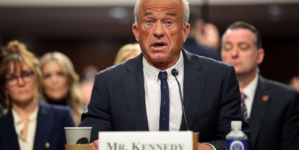-
What institutions, government buildings are closed on Good Friday - 9 mins ago
-
How to Buy Cactus Jack WWE Collaboration: Travis Scott WrestleMania Merchandise - 14 mins ago
-
Man who escaped custody sentenced for killing woman while she was housesitting for relatives - 23 mins ago
-
Nikola Jokic, LeBron, Steph Curry highlight Colin’s Top 10 players in NBA playoffs | The Herd - 27 mins ago
-
‘James Bond’ star flaunts bulked-up physique with dramatic body transformation - 31 mins ago
-
Judge moves toward shuttering troubled Los Padrinos Juvenile Hall - 49 mins ago
-
Twins’ $200 Million Superstar Shockingly Could Be on Trade Block - 54 mins ago
-
2025 NBA playoff odds, predictions: Back Pistons upset in first round - about 1 hour ago
-
RFK Jr.’s Ideas Are Catching on Across the U.S. - 2 hours ago
-
U.S. airstrikes target Ras Isa oil port in Yemen - 2 hours ago
Palestinian Pastor: Huckabee Shows the Danger of Mixing Theology and Politics | Opinion
Mike Huckabee, speaking at his Senate confirmation hearing last month for the ambassadorship to Israel, stressed that he would “carry out the president’s priorities, not mine,” suggesting that his personal views would not influence his diplomatic role.
Let’s hope so. While Mr. Huckabee attempted to distance himself from his past statements on Middle East politics, those statements have reflected political and theological views that dehumanize Palestinians and ultimately dishonor the Jewish people. Nonetheless, the Senate confirmed him on Wednesday, ensuring his ideology will help shape American foreign policy in one of the most volatile regions of the world.
I am a Palestinian-American who has served as an evangelical minister for more than 20 years across the United States and the Middle East, committed to the gospel, rooted in conservative values, and walking alongside Christian believers from all backgrounds. I’ve seen what happens when ideology hijacks our theology. Empathy disappears, justice is dismissed, and the people who live in the land are dehumanized.
The United States has a vital role in promoting stability, justice, and peace in the Middle East. That’s why I find Mike Huckabee’s confirmation as U.S. ambassador to Israel so deeply troubling.
The new ambassador’s vision offers no future for the millions of Palestinians, including the Christian communities of Bethlehem and elsewhere on the West Bank, in Gaza, and in East Jerusalem, who have lived in the land since the time of Jesus. I feel this personally. My own family lives in Bethlehem, and my wife’s extended family remains in Gaza, where they continue to suffer under Israeli military aggression.
Over the years, Mr. Huckabee has denied the existence of the Palestinian people, calling them “a political tool to try and force land away from Israel.” He has rejected the concepts of occupation and settlements, dismissed the legitimacy of Palestinian statehood and once declared, “There’s really no such thing as a Palestinian.” In another instance, he said, “There is no such thing as a West Bank—it’s Judea and Samaria,” a reference to the Biblical names favored by the Israeli Right.
These are not the words of a diplomat. They reflect a disregard for international law and global consensus—including UN Security Council Resolutions 242 and 2334, which affirm the inadmissibility of territorial acquisition by war and declare Israeli settlements a flagrant violation of international law.
What undergirds Mr. Huckabee’s statements is a strain of Christian Zionism rooted in a 19th-century end-times framework known as dispensationalism—a belief system that interprets modern events in Israel as signs of the fulfillment of Biblical prophecies.
Popularized by the 1909 Scofield Bible and modern televangelism, this theology sees Israel’s 1948 founding not as Jewish self-determination but as a prophetic sign of the end times marked by global tribulation, Jewish conversion, and Christ’s return to rule from Jerusalem.
On his show Huckabee Today, Mr. Huckabee enthusiastically endorsed prolific Christian author Max Lucado’s end-times book, which outlines the dispensationalist timeline. Lucado, in a CBN interview, warned that “there will be trouble on earth in the nation of Israel” during that period. Huckabee praised Lucado’s account as “a great service” to Christians.
Kevin Dietsch/Getty Images
This is not a fringe belief for Mr. Huckabee—it’s central to how he interprets Israel’s modern role. He has described the growth of Israel as “scripture come to life,” declared that “God gave [Israel] to the Jewish people 3,500 years ago,” and described the country as “the literal fulfillment of Bible prophecy.”
These views reflect a belief that modern Israeli politics fulfill Biblical prophecy—and help explain Huckabee’s disregard for Palestinian existence and suffering.
At his confirmation hearing, Mike Huckabee declared, “We ultimately are people of the book. We believe the Bible. And therefore, that connection is not geopolitical. It is also spiritual.” That single line reveals a worldview that equates modern Israel with Biblical Israel—and views the former’s politics as divinely mandated.
This approach erases divisions among Jews and Israelis and promotes government policy as the realization of prophecy. The problem isn’t with the sacred text—or even its interpretation—but with how it’s twisted to defend policies that contradict Christianity’s core message of peace. For Palestinian Christians like my family, this politicized theology doesn’t just distort the gospel—it turns it against us.
This narrative may speak the language of Christian love for Israel, but it reduces Jewish identity to a prophetic role in an end-times script. Fundamentally, it does not honor the Jewish people or affirm the richness of Judaism, no matter how often it waves the Israeli flag. Instead, it casts them—along with others—as players in a timeline that elevates theological fulfillment over human dignity and the gospel’s call to love and peace.
While only a minority of Christians subscribe to this theology, it remains a powerful current in American evangelicalism.
The historian Daniel Hummel has noted that Huckabee’s unwavering support for Israel is deeply rooted in his end-times understanding. As Rabbi Jonah Pesner warned in a letter to the Senate, Mr. Huckabee’s ideology “professes a love of Israel rooted in the belief that Jewish sovereignty over the biblical land of Israel will hasten the return of Jesus Christ.”
Faithful Christians hold a range of views about the end times, often shaped by sincere devotion to Scripture. But whatever one’s interpretation, we cannot ignore the realities on the ground for Palestinians: decades of occupation, displacement and suffering. No end-times scenario—however sincerely held—gives us permission to turn away from injustice. That’s why I joined key Middle Eastern evangelical leaders in issuing a Collective Call urging the global Church to hear the voices of Christians in the region and work toward peace.
Gaza is facing a humanitarian catastrophe: starvation, collapsing hospitals, and children undergoing surgery without painkillers. According to UNICEF, more than 15,000 children have been killed since October 7, 2023, and nearly a million have been displaced. That Mr. Huckabee has offered no word of compassion reveals the moral cost of a misguided theology fused with uncritical political loyalty—an ideology that sanctifies suffering rather than rising to the honorable role of diplomacy and the pursuit of peace.
America’s strength in the Middle East lies in advancing justice, mutual respect, and lasting prosperity for all its people. We need an ambassador who walks into the room believing peace is possible—even if it’s hard, even if it takes decades. We need a peacemaker, not a preacher of permanent war. Confirming Mike Huckabee sent the opposite message: that U.S. diplomacy is no longer anchored in truth or compassion, but in ideology masquerading as faith. An ambassador’s role is to build bridges—not to hasten the apocalypse.
Dr. Fares Abraham is a Palestinian-American thought leader and the founder of Levant Ministries. He grew up in Bethlehem and now leads several ministries across the Middle East to strengthen gospel witness and promote peace. Follow him on Instagram @faresabraham
The views expressed in this article are the writer’s own.
Source link






























